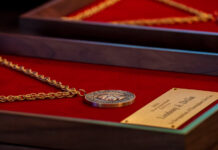
Despite what many westerners believe, Muslims who live in Indonesia and other democracies with Islamic majorities are tolerant people – that was the message from Boston University professor Jeremy Menchik during a recent presentation at the University of Louisville.
Menchik has done extensive research on the effect of religion on politics and human behavior in Indonesia, the world’s third largest democracy. Nearly 90 percent of Indonesians are Muslim and 99 percent call themselves “very religious.” That faith, rather than support for freedom or autonomy, bolsters their tolerance toward people of other religions, according to Menchik. While Indonesian Muslims oppose interfaith marriage and non-Muslims holding the highest political offices, Menchik says they are largely “accepting” of other religious groups.
Menchik told his UofL audience the definition of tolerance in the United States is clearly more liberal than what’s considered tolerant in Indonesia, but both countries have thriving democracies and “that’s what we want to see in other” Muslim majority countries. Menchik, an assistant professor in Boston University’s Pardee School of Global Studies, claims Indonesians are becoming more tolerant of others’ beliefs but that hasn’t necessarily spread to other Muslim majority countries in the Middle East and elsewhere.
Menchik’s talk was sponsored by the UofL Center for Asian Democracy and the Paul Weber Endowed Chair for Politics, Science, and Religion in the UofL Political Science Department.
































